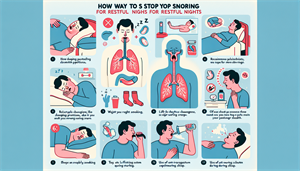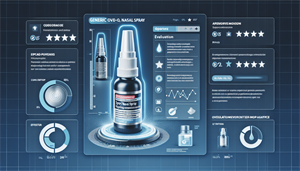
How to Stop Snoring: Proven Methods for Restful Nights
Snoring can be a nuisance, not only for the person who snores but also for their bed partner. It can disrupt sleep, cause daytime fatigue, and even strain relationships.
But what if there were simple, proven ways on how to stop snoring and improve your sleep quality? In this article, we will explore effective methods to put an end to snoring and leave you and your partner with a peaceful night’s sleep.
The Importance of Side Sleeping
Did you know that your sleep position can significantly impact your snoring? Sleeping on your side has been shown to reduce snoring by preventing the obstruction of air through the throat.
This is because when you sleep on your back, gravity can cause your tongue and soft palate to collapse to the back of your throat, blocking the airway and resulting in snoring.
Maintaining a side sleeping position throughout the night can be supported by using a body pillow or other techniques, which can also prevent you from involuntarily sleeping on your back. A body pillow aids in keeping this position by providing necessary support and hindering any involuntary roll onto your back.
Consistently sleeping on your side could lessen the intensity of your snoring, paving the way for a more peaceful night’s sleep for both you and your partner.
Mouthpieces for Snoring Relief
Mouthpieces, such as mandibular advancement devices and tongue stabilizing devices, are recommended by the American Academy of Sleep Medicine and the American Academy of Dental Sleep Medicine as a way to treat snoring.
These oral appliances work by adjusting the positioning of the jaw, tongue, and soft palate, helping maintain an open airway during sleep and reducing snoring. Although mouthpieces can be effective in reducing snoring, they may also cause side effects. Following the instructions provided with the mouthpiece is vital, and professional consultation should be sought if any problems emerge.
Snoring Related Treatments
Oropharyngeal exercises, uvulopalatopharyngoplasty (UPPP), mouthguards, continuous positive airway pressure (CPAP), somnoplasty, oral appliances, palatal implants, and radiofrequency tissue ablation are some of the treatments available for snoring relief. You may need to experiment with different treatments, as some may help you find the one that works best for you.
Nasal Strips and Dilators: Clearing the Airways
Nasal strips and dilators can be effective in reducing snoring by increasing the space in the nasal passages and decreasing airflow resistance, allowing for easier breathing.
Nasal strips are adhesive strips that can be affixed to the bridge of the nose, expanding the nasal passage and improving breathing. Internal nasal dilators that can be inserted into the nose are also available.
The benefits of using nasal strips and dilators are numerous, including the enlargement of nasal passages, reduction in airflow resistance, and facilitation of easier breathing, all contributing towards snoring reduction.


